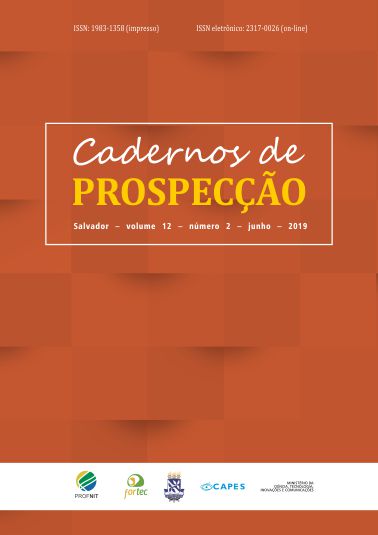Editorial
DOI:
https://doi.org/10.9771/cp.v12i2.28808Abstract
In this volume, Revista Cadernos de Prospecção, in its mission to disseminate and socialize scientific knowledge related to innovation and produced in the most diverse entities, publishes 18 articles. Of these, 13 address the topic of Technological Prospecting, four present small enterprises that seek development through technological mechanisms and arrangements, and one article deals with the Geographical Indication (GI). Technological Prospecting qualifies research, as it aims to verify the frontiers in which knowledge in a specific area is at a given moment. This volume presents prospective studies on various technologies, involving the environment, food, cosmetics, among others. In Brazil, technology transfer has been one of the major bottlenecks in the innovation process, especially with regard to financial and technical resources for closing the innovation cycle, which occurs when technology reaches the market. The transfer of technology from Scientific and Technological Institutions (ICTs) to the productive sector has advanced slowly. The role of Innovation Centers (NITs), created by Law nº 10.973/2004, Technological Innovation Law, regulated by Decree nº 5.563/2005, as important actors for the technologies developed in ICTs to reach the market is highlighted. Thus, the NITs are responsible for transferring these technologies to partners who will apply them in products. Even with the regulatory apparatus, the NITs have found it difficult to carry out this transfer, often restricting themselves only to the protection of intellectual property, motivated by several factors, such as the lack of qualified personnel and the legal certainty required for the business aspects involved in the technology transfer. In this sense, the new Legal Framework, established through Law nº 13.243/2016, regulated by Federal Decree nº 9.283/2018, seeks to bring facilitating mechanisms to create a more favorable environment for interaction between companies and public ICTs, highlighting some flexibilities specific to Law no. 8.666/1993 and its amendments (known as the Bidding Law) and Law n. 8,112/1990 and its amendments (known as the Public Servant Law). It should be noted that there are aspects that directly impact the technology transfer process, however for public ICTs to make use of the benefits provided for in these legal documents, it is necessary for the ICT to have a forecast in its Innovation Policy on the way in which it will operationalize the versatility made possible by legislation. Local productive arrangements (APL) are presented as a collective action, enhancing resources, both technical and financial, as the technologies that spring from this collectivity place technological innovation as a basis for social innovation and also promote regional development as a whole. Reading the content presented in this volume will enrich knowledge, according to the purposes of the articles prepared by the respective authors. Good reading.Downloads
Download data is not yet available.
Downloads
Published
2019-06-18
How to Cite
Frey, I. A. (2019). Editorial. Cadernos De Prospecção, 12(2), 243. https://doi.org/10.9771/cp.v12i2.28808
Issue
Section
Editorial
License
Copyright (c) 2019 Cadernos de Prospecção

This work is licensed under a Creative Commons Attribution-NonCommercial 4.0 International License.
O autor declara que: - Todos os autores foram nomeados. - Está submetendo o manuscrito com o consentimento dos outros autores. - Caso o trabalho submetido tiver sido contratado por algum empregador, tem o consentimento do referido empregador. - Os autores estão cientes de que é condição de publicação que os manuscritos submetidos a esta revista não tenham sido publicados anteriormente e não sejam submetidos ou publicados simultaneamente em outro periódico sem prévia autorização do Conselho Editorial. - Os autores concordam que o seu artigo ou parte dele possa ser distribuído e/ou reproduzido por qualquer forma, incluindo traduções, desde que sejam citados de modo completo esta revista e os autores do manuscrito. - Revista Cadernos de Prospecção está licenciado com uma Licença Creative Commons Attribution 4.0. Esta licença permite que outros remixem, adaptem e criem a partir do seu trabalho para fins não comerciais, e embora os novos trabalhos tenham de lhe atribuir o devido crédito e não possam ser usados para fins comerciais, os usuários não têm de licenciar esses trabalhos derivados sob os mesmos termos.
Este obra está licenciado com uma Licença Creative Commons Atribuição 4.0 Internacional.








